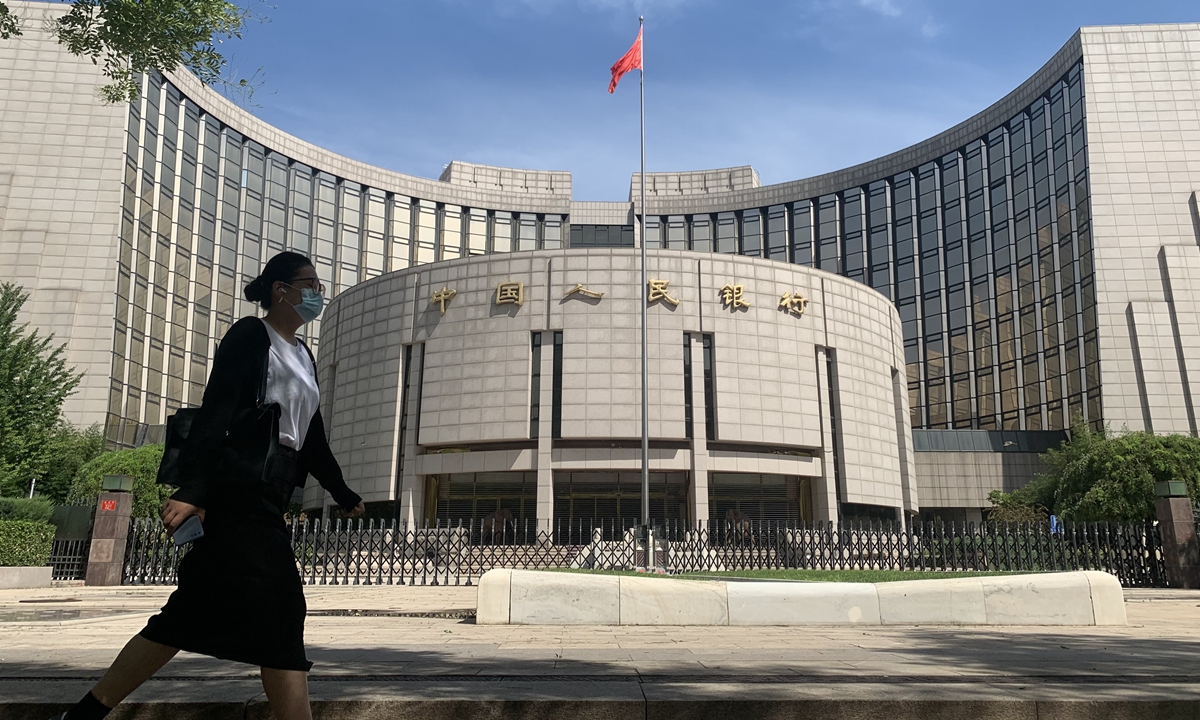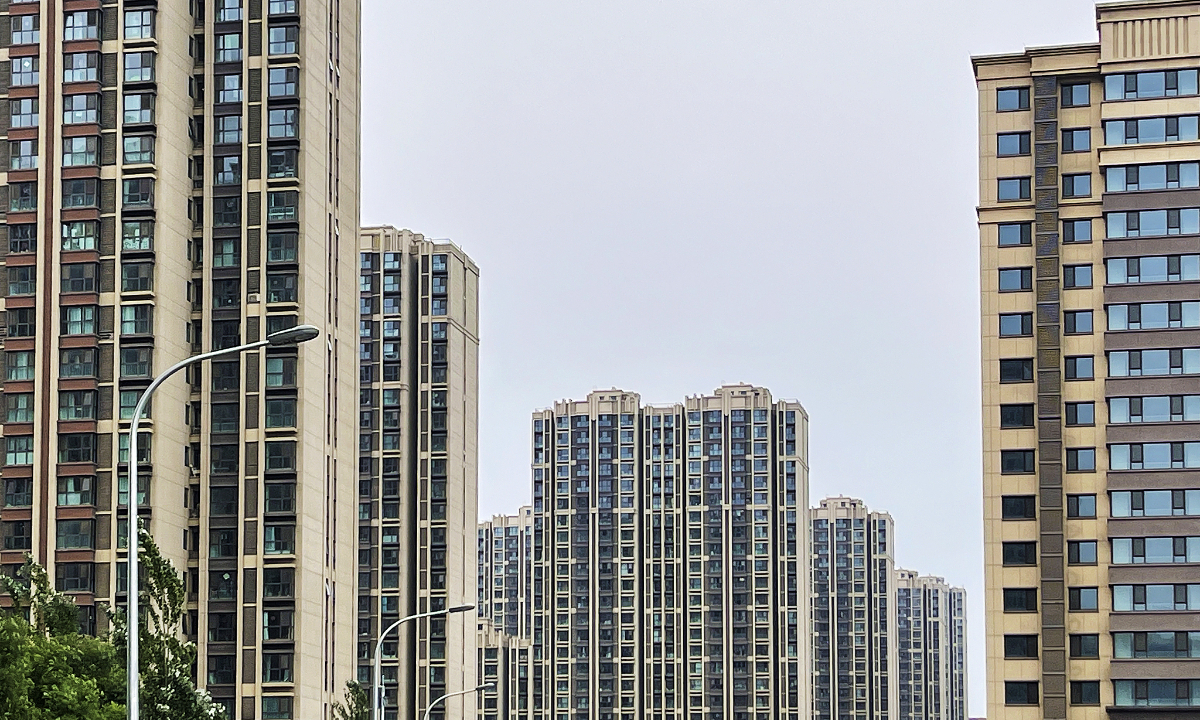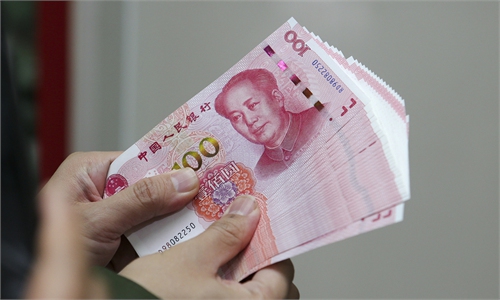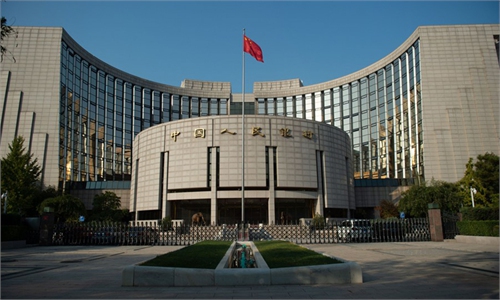China rolls out forceful policy mix to spur economy in push to meet growth goals
Economic recovery gathers steam in post-COVID period: analyst

A view of the PBC building in Beijing on August 22, 2022. Photo: VCG
China issued more vigorous policies in recent days to support the economy across all fronts including the private economy, real estate, currency and employment, as the country ramps up efforts to bolster the economy and boost market confidence. Major economic data shows that the policy mix is producing effects, with experts saying that China's post-pandemic economy has been through a relatively difficult period and is increasingly gathering steam despite headwinds from a global slowdown and remains well on track to meet its annual growth goals.
Experts said the Chinese economy is better than what Western media have made it out to be, calling for confidence and patience in China's post-pandemic recovery of the economy, a stabilizer for the world economy amid downward pressures and uncertainties.
There is no need to worry about the long-term bright prospects of the world's second-largest economy, as the Chinese policymakers are well aware of the crux of the problem and is making utmost efforts to deal with "twists and turns" in China's post-COVID-19 economic recovery, they said.
In meeting with visiting IMF Managing Director Kristalina Georgieva on Friday in Beijing, Chinese Premier Li Qiang said since the beginning of this year, China's economy has continued to recover and is generally recovering for the better.
"We will further strengthen policy coordination, promote economic growth, persist in reform and opening-up, optimize the development environment for private enterprises, promote stable scale of foreign trade and optimize its structure, and make greater efforts to attract and utilize foreign investment," Li said.
Georgieva said that China's economy contributes to one third of the world's economic growth, and the IMF speaks highly of China's strong leading role in driving global economic growth.
Recently, Huawei's comeback with its cutting-edge Huawei Mate 60 series despite US sanctions greatly boosted morale in the country, indicating the continuous release of more momentum and vitality, observers said, noting that China's sound economic growth and breakthroughs in core technologies will refute Western media pessimism.

Beijing real estate Photo:VCG
Vigorous policies
Following a key meeting on July 24, Chinese government agencies and local government are taking active action to come up with a raft of vigorous policies to build stronger driving forces and a more solid foundation for the country's economic recovery.
On Friday, the People's Bank of China (PBC), the central bank, said that it will cut the foreign exchange reserve requirement ratio for financial institutions by 2 percentage points to 4 percent from September 15, in a bid to improve the capacity of financial institutions to use foreign exchange funds.
Beijing and Shanghai both said on Friday that homebuyers and their immediate family members will be treated as first-time homebuyers for loans, regardless of their mortgage record, as long as they don't own another home in their cities, sending a strong signal that the country is resolved to revive its property sector.
Earlier on Thursday, the PBC and the National Administration of Financial Regulation said that interest rates of existing mortgages for first-home purchases will be lowered starting from September 25, while the minimum down payment ratio for individuals' commercial housing mortgages for first-home and second-home purchases will be adjusted to be no lower than 20 percent and 30 percent respectively, nationwide.
This is a very rare but innovative policy tool in the history of China's real estate market, which will give a strong boost to the domestic real estate market while meeting residents' reasonable housing consumption demand, Yan Yuejin, research director at Shanghai-based E-house China R&D Institute, told the Global Times.
As part of the country's efforts to boost the growth of the private economy, the country's financial regulators including the PBC held a meeting on Wednesday, urging banks to step up lending to private companies, according to a statement on the PBC's website.
"The policy mix is well designed and forceful, and will play a significant role in boosting confidence," Zhou Mi, a senior research fellow with the Chinese Academy of International Trade and Economic Cooperation, told the Global Times.
Improved expectations
"Multiple economic indexes indicate that the Chinese economy is through a relatively difficult part of the post-COVID-19 recovery, as a raft of policies are producing effects and the impact of the pandemic is diminishing," Yu Lingqu, director of Financial Development and SOE Research Department at the China Development Institute in Shenzhen, Guangdong Province, told the Global Times on Friday.
China's private Caixin services purchasing managers' index rose to 51 in August from 49.2 in July, beating analysts' forecasts of 49.3 and marking the highest reading since February. A reading above 50 indicates expansion, while a reading below reflects contraction.
Compared with the first half, consumers and enterprises' confidence has notably improved following the implementation of a series of policies since July, indicating that policymakers are well aware of the crux of the problem and their precisely targeted policies are producing effects, Wang Peng, an associate research fellow at the Beijing Academy of Social Sciences, told the Global Times on Friday.
Experts rebuked Western reports claiming that China's growth engine is sputtering and will likely have adverse consequences for global growth. "There is no need to worry about China's economy. The strong resilience, vast market potential and innovation vitality boost the confidence in the steady and sustained development of the economy," Wang said.
China's economy has great potential for a relatively high-speed growth of 6-7 percent year-on-year in the medium and long-run, Yu said, noting that the economy is expected to return to a normal growth track in the first half of 2024.
Yu said there is vast potential in the world's second-largest economy to be tapped. "For example, the country's infrastructure per capita is far lower than those in developed countries. The authorities could further strengthen fixed-asset investment to stimulate private investment and drive up domestic consumption," he said.
With expectations that the number of domestic passenger trips from June to August will surge past 1.85 billion, the China Tourism Academy recently predicted the cultural tourism market for this summer holiday season will be the hottest in the last five years.

Photo:VCG
China also witnessed a movie frenzy this summer. Official data shows that China's box office revenue for the 2023 summer movie season reached 20.6 billion yuan ($2.84 billion) between June and August.
Boosted by a strong rebound in China's consumer sentiment, leading global retailers such as home furnishing company IKEA and toymaker Lego have announced ambitious investment plans in the market for seeking greater opportunities and potential.
IKEA on Wednesday announced it will invest 6.3 billion yuan over the next three years in China to strengthen home living-related services, customized shopping experience and omni-channel expansion, according to a press release sent to the Global Times.
Lego, meanwhile, said it will continue to accelerate its expansion in China in brick-and-mortar stores and online, as its consumer sales globally outperformed the global toy market in the first half year.
"We regard China as a strategic growth market. We have confidence in the prospects of the Chinese market, and we will continue to invest in China," Paul Huang, general manager of LEGO China, said in August at the opening of a major store in Changsha, Central China's Hunan province, according to media reports.
Opening-up and cooperation
Despite sluggish economic growth worldwide in 2023, China has navigated economic headwinds with an effective policy mix and achieved sustained and stable development so far this year, injecting certainty into the global economy.
Amid rising unilateralism and protectionism globally, China is taking a more active initiative in promoting high-level opening-up and advocating for the building of an open economy, which will give a further boost to economic recovery in China and the world as a whole, experts said.
China has generated 41 percent of the world's growth in the past ten years, almost double the 22 percent contribution from the US, and dwarfing the 9 percent contribution from the euro area, the Guardian reported in August, citing Dhaval Joshi of BCA Research.
The 2023 China International Fair for Trade in Services (CIFTIS) is scheduled to kick off in Beijing on Saturday, the third Belt and Road Forum for International Cooperation will be held in Beijing in October and the sixth China International Import Expo will be held in Shanghai in November.
In addition, China has ratcheted up efforts to boost institutional opening-up and free trade and investment. The Regional Comprehensive Economic Partnership has taken effect in all 15 signatory countries. China and Singapore have substantively concluded subsequent negotiations on an upgraded bilateral free trade agreement (FTA), China and Honduras announced the launch of FTA negotiations in July, and China and Nicaragua signed an FTA very recently.
"As the world's second-largest economy, China always strives for win-win and mutual development with other economies. However, some Western economies led by the US keep pushing toward 'economic decoupling' with China and are attempting to exclude China from global supply chains, leading to disruptions in normal international economic cooperation," Zhou said.
In recent days, the unexpected debut of Huawei's latest Mate60 pro series drew much excitement in China, as it's speculated to be powered by Kirin chips designed by HiSilicon, Huawei's chip arm.
The debut of Huawei Mate60 proves that the US and its allies have not been able to block China's independent innovation in the high-tech sector, and that the country's sci-tech research and development (R&D) and industrial system are effective, analysts said, noting that it foretells the continuous release of internal momentum and vitality in China.
As China plays an important role in driving global economic growth, the country is willing to enhance economic and trade cooperation with other countries to let them enjoy the dividends brought by China's sustained development, Zhou said.



